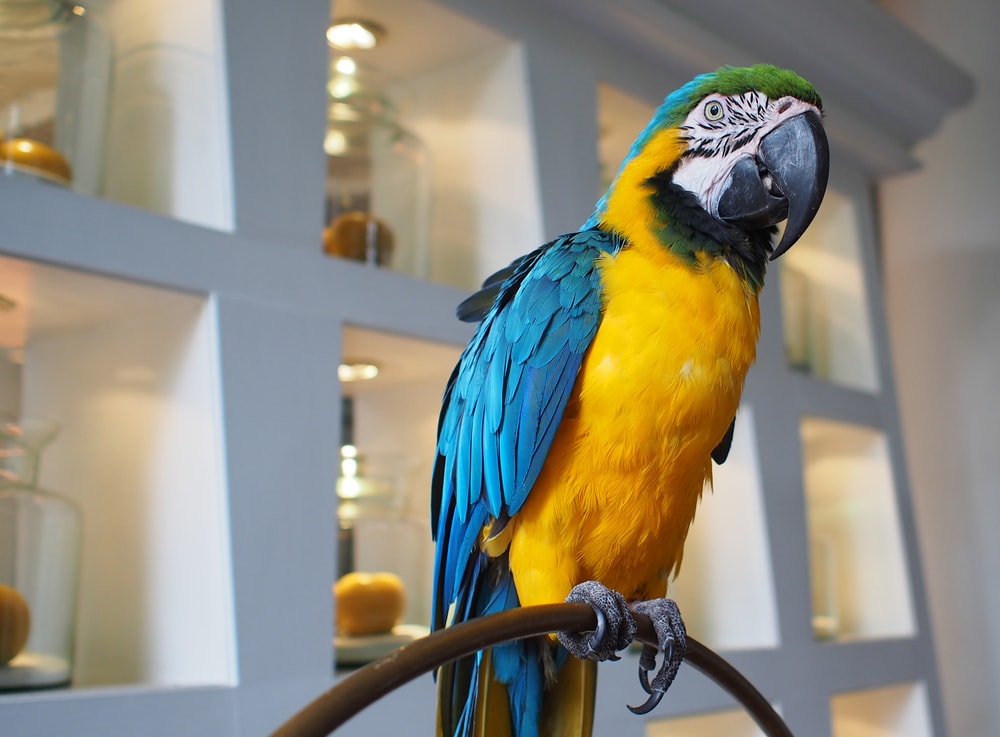Can Parrots Eat Pears? Vet-Approved Facts & FAQ
By Ed Malaker
Updated on

Click to Skip Ahead
Parrots can make wonderful pets and have many fascinating behaviors. They have a diverse diet of many fruits and vegetables. You might be wondering if you can safely feed pears to your parrot.
Fortunately, parrots can eat pears, though there are a few considerations to make. Keep reading for a list of the pros and cons of this tasty fruit and tips on feeding it to your pet bird.
Benefits of Feeding Pears to Parrots
Nutrient Content
Pears are a good source of nutrients like vitamins C, K, and B. They also contain dietary fiber, which can contribute to the overall health of the parrot.

Hydration
Pears contain a large amount of water, which can contribute to the hydration of your parrot. Adequate hydration is essential for the proper functioning of various bodily processes.
Digestive Health
The fiber content in pears can aid in digestion and help prevent constipation, which is particularly important for parrots, as digestive issues can be common in birds.
Antioxidants
Pears contain antioxidants, such as flavonoids and carotenoids, that can help combat oxidative stress and support the bird’s immune system.

Variety in Diet
Offering a variety of fruits, including pears, can help ensure that your parrot receives a diverse range of nutrients. This is vital for maintaining overall health and preventing nutritional deficiencies.
Foraging Behavior
Introducing different fruits like pears into your parrot’s diet can encourage natural foraging behaviors. This mental stimulation is essential for the psychological well-being of your parrot.
Taste and Enrichment
Pears have a sweet and juicy flavor that many parrots enjoy. Having various tastes and textures in their diet can contribute to their overall satisfaction and enrichment.
Risks of Feeding Pears to Parrots
High Sugar Content
Pears contain natural sugars, and excessive sugar intake may contribute to obesity and other health issues in parrots. Offering too many sugary fruits, including pears, may contribute to weight gain and other metabolic problems.

Diarrhea and Digestive Upset
The high water and fiber content in pears can have a laxative effect on some birds. Feeding too many pears at once may lead to diarrhea or other digestive upset.
Seed Toxicity
Like many fruits, pears contain seeds. While the seeds of pears are not generally considered toxic, they do have small amounts of cyanide, so it’s a good practice to remove the seeds before offering pears to your parrot to avoid any potential issues.
Allergic Reactions
Some parrots may be allergic to certain fruits, including pears. Monitor your parrot closely after introducing pears to their diet for any signs of allergic reactions.

Nutrient Imbalance
While pears offer various nutrients, they may not provide everything that’s needed for a parrot’s well-being. Relying too heavily on one type of food, even if it’s fruit, can lead to nutrient imbalances and deficiencies.
Pesticides
Many fruits, including pears, are treated with pesticides to protect them as they grow, and they can still be on the surface when you purchase them. Therefore, it’s important to wash them carefully before feeding them to your pet.
Preparing Pears for Parrots
- Select ripe pears that are not overly soft or mushy. Ripe pears are easier to eat and more palatable for parrots.
- Wash the pear thoroughly under running water to remove any pesticides, dirt, or contaminants from the skin.
- Pears contain seeds, and you will need to remove them before offering pears to your parrot. The seeds contain small amounts of cyanide, which can be harmful if consumed in large quantities.
- Cut the pear into small, bite-sized pieces that are appropriate for your parrot’s size.
- While pears can be healthy treats, you should only offer them in moderation to avoid issues like diarrhea, obesity, or nutrient imbalances.
- If your parrot doesn’t usually eat pears, introduce them gradually to allow the bird’s digestive system to adjust.
- Do not feed processed or sweetened pears to your parrot, as added sugars and preservatives can be harmful. Stick to fresh, raw pears.
Frequently Asked Questions
How Often Can I Feed Pears to My Parrot?
Parrots should eat pears in moderation as part of a varied diet. Once or twice per week as part of a balanced diet should be more than enough.
Can Parrots Eat the Skin of a Pear?
While the skin is generally safe, washing the pear or removing the skin is recommended to remove any pesticides or contaminants.

What Other Fruits Can I Include in My Parrot’s Diet?
Parrots can eat a wide variety of fruits, including apples, berries, melons, and citrus fruits.
Can I Feed Dried Pears to My Parrot?
While you can technically give dried fruits to your parrot in moderation, it’s crucial to check for added sugars and preservatives. Fresh, raw pears are better options.
Can I Give Pear Juice to My Parrot?
It’s best to offer fresh, whole fruits rather than fruit juices, as these may contain added sugars and lack the fiber present in whole fruits.
Summary
Parrots can eat clean, fresh pears, and they can be quite healthy for these birds, providing plenty of vitamins, minerals, antioxidants, and fiber. Many parrots seem to like their taste, and they can help create a varied diet. However, pears also have a large amount of sugar, which can lead to obesity, and the high fiber and water content might lead to digestive upset and diarrhea, especially the first few times your pet eats it. You will need to watch them carefully for signs of problems and discontinue offering pears if you notice any.
Featured Image Credit: Ahanov Michael, Shutterstock












